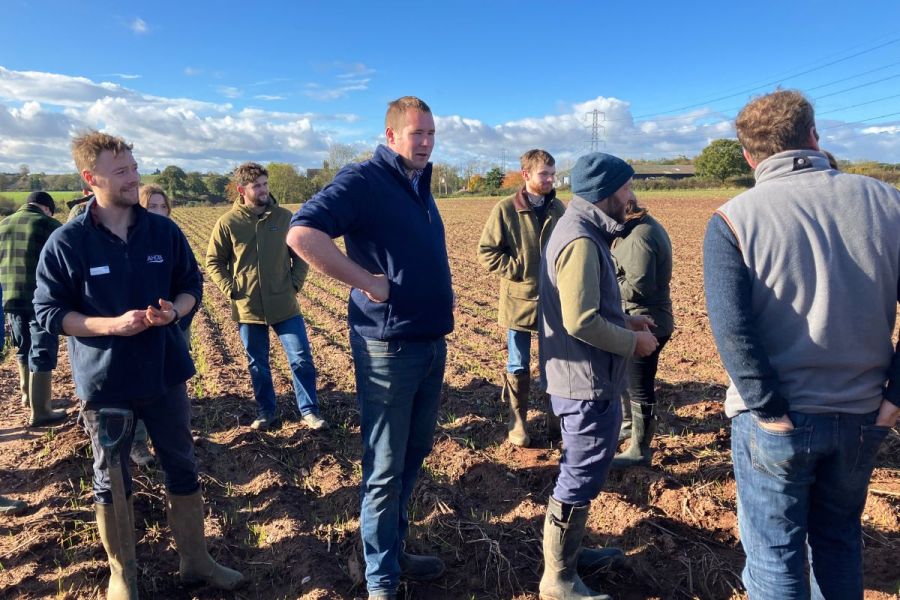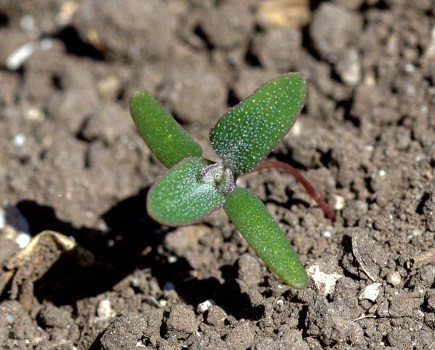AHDB Monitor Farms is a nationwide network of like-minded growers with the common goal of improving their business through sharing performance information and best practice. CPM learns more about what’s involved.
“It takes place on commercial farms, providing a hands-on approach to personal and business development.”
By Janine Adamson
Open-minded, ambitious and sociable – adjectives which could all easily be used to describe AHDB’s latest monitor farmer, Jack Houghton. After all, they’re on the job specification and prerequisites of the position. And in a sector where you only ‘get out what you put in’, he proved a prime candidate for the role.
Jack is the first West Midlands monitor farmer to be appointed post-pandemic and he’s in his early thirties. He says because of this, his driver is to encourage more people to join the industry. “I’m often the youngest in the room. That has to change so that farming has a future.
“I’m not one for sitting around talking about new ideas – I want to get out and try them. If it goes wrong, it goes wrong, but you always learn something. And if I can share that learning, it’s even more useful. That’s why I’m excited to become a monitor farmer,” he says.
Jack runs DW Burton Farms in Wolverhampton – just over 800ha of owner-occupied land and farming agreements. His goals include stabilising the businessby securing long-term tenancies and contract farming agreements, reducing inorganic inputs, and building soil organic matter.
But how does being a monitor farmer contribute towards those valiant ambitions? Dr Alex Ansell is AHDB’s cereals & oilseeds knowledge exchange manager for the West Midlands and Wales, and will be supporting Jack during the next three years as he invites local farmers to join him for a series of knowledge exchange events.
Alex says the programme has unique principles. “It’s a farmer-led, farmer-driven project with business efficiency and benchmarking at the heart of its activity. It takes place on commercial farms, providing a hands-on approach to personal and business development. This makes it attractive to other members of the farming community,” she explains.
The monitor farming concept first originated in New Zealand, was adopted in Scotland in 2003 and rolled out across England, Northern Ireland and Wales in 2014.
How it works, is, a monitor farmer partners with their local AHDB knowledge exchange manager to host around five meetings each year. These farmer-led meetings provide the opportunity to find and share challenges and solutions, as well as spend time socialising with peers.
During the three-year programme every aspect of a farm business is scrutinised with the host farm serving as a case study – from soil management to machinery policy, but with cost implications to the farm business always taking centre stage.
Alex says with a focus on making real developments in business management, improving productivity, competitiveness and environmental management, it’s about embracing innovative ideas, all with the support of AHDB and industry experts.
“It takes a special mix of qualities to be a monitor farmer. Jack is keen to try out new arable farming methods in practical ways, and to share the results at his meetings to both inspire others and learn from discussions generated,” she says.
As for AHDB, Alex stresses that knowledge exchange is a mainstay of the levy board’s offer to growers. “The knowledge exchange team is a key part of the service AHDB provides, facilitating peer-to-peer learning, carrying out on-farm research and connecting growers with the best information and expertise.
“This is enabled by our network of Strategic Farms, Monitor Farms and Arable Business Groups. However, we are always eager for more farmers to be involved to continue the good work, which is why we’re undertaking a recruitment campaign for new Monitor Farms,” she comments.
At the other end of the spectrum is Newbury-based Rob Waterston who’s approaching the end of his tenure as a monitor farmer. He manages the Welford Park Estate – looking after 1072ha of mostly wheat, winter beans, oilseed rape and spring barley.
According to Rob, it was attending meetings with former Wantage Monitor Farm host Julian Gold that inspired him to take on the role. “I attended the meetings and always felt as though I took a lot from it – it’s important to visit different farms and share experiences.
“So I thought, why not? Admittedly I felt a little daunted as I knew it would push me, but that’s good because it’s easy to become complacent,” he says.
During his time as a monitor farmer, Rob has engaged in trials such as assessing the impact of cover cropping on soil biology, going fungicide free through optimising crop nutrition, and whether drilling a companion crop into spring oats can be a success.
Having hosted a variety of meetings, he says one of the most important things to consider when embarking on the role is the ability to be transparent.
“You have to be open and prepared to be challenged and questioned by others who are sometimes further on in their journey than you are. We’ve always acknowledged that our business isn’t perfect, and at times we’ve had difficult harvests, but being a Monitor Farm has proven a good way to scrutinise our ways of working,” explains Rob.
Equally, he believes choosing strong subject areas to attract audiences from both the local area and beyond is key to success.
“It’s about attracting the right sorts of people to visit the farm. AHDB provides support in sourcing quality speakers for the meetings which is valuable in terms of delivering a worthwhile event that keeps people engaged.”
Topics covered at Rob’s meetings include agri-environment and natural capital markets; cover cropping; labour and machinery review; and the recent soil secrets tour with Joel Williams.
Finally, Rob says having a strong handle of data is essential. “We’d long been part of a benchmarking group, so were familiar with gathering quality data and confident about sharing it with others. Having good sources, comprehensive monitoring and record-keeping all helps to support being a monitor farmer.
“That said, none of it’s a hardship. In reality, being a Monitor Farm is hosting a few meetings a year and as a result you have the pleasure of meeting people you wouldn’t usually meet. Be prepared to be scrutinised, be open, and enjoy the process,” he says.
Knowledge exchange manager, David Hunter, says Rob’s easy-going nature and ability to communicate have contributed to the success and popularity of the Welford Estate as a host farm.
“The arrival of Covid mid-term resulted in a change from face-to-face meetings to webinars which was also accommodated with good grace. We’ve touched on openness as a requirement of the monitor farmer, and this, coupled with Rob’s honesty and willingness to bare all, has also been key to its success.”
David believes the relationship between the monitor farmer and knowledge exchange manager is also important. “The creation of engaging and informative meetings takes time and relies on regular communication. Rob’s timely responses to queries and keenness for visiting farmers to get value for their time at meetings have been a consistent theme at the venue.
“The Newbury Monitor Farm leaves a great legacy and will be difficult to replace. However, as the numbers of monitor farms past and present grows, the network of knowledge exchange strengthens to the benefit of all.”
AHDB is recruiting for Monitor Farms in the following areas – Lancashire or Cumbria; North Yorkshire, Durham or Northumberland; Warwickshire, Worcestershire or Herefordshire; Lincolnshire; Essex; Devon or Cornwall; Oxfordshire, Hampshire, Surrey, Sussex or Kent; Wales (all).
This article was taken from the latest issue of CPM. Read the article in full here.
For more articles like this, subscribe here.
Sign up for Crop Production Magazine’s FREE e-newsletter here.




